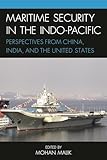Maritime security in the Indo-Pacific : perspectives from China, India, and the United States Mohan Malik
Material type: TextLanguage: Eng. Publication details: Rowman and Littelfield 2014 LanhamDescription: 294p. 16.66 x 2.59 x 23.39 cmISBN:
TextLanguage: Eng. Publication details: Rowman and Littelfield 2014 LanhamDescription: 294p. 16.66 x 2.59 x 23.39 cmISBN: - 9781442235328
- 359.03095 MAL
| Item type | Current library | Call number | Materials specified | Status | Date due | Barcode | |
|---|---|---|---|---|---|---|---|
 Books
Books
|
Rashtriya Raksha University | 359.03095 MAL (Browse shelf(Opens below)) | Available | 10065 |
Browsing Rashtriya Raksha University shelves Close shelf browser (Hides shelf browser)
In the twenty-first century, the Indo-Pacific, which spans from the western Pacific Ocean to the western Indian Ocean along the eastern coast of Africa, has emerged as a crucial geostrategic region for trade, investment, energy supplies, cooperation, and competition. It presents complex maritime security challenges and interlocking economic interests that require the development of an overarching multilateral security framework. This volume develops common approaches by focusing on geopolitical challenges, transnational security concerns, and multilateral institution-building and cooperation. The chapters, written by a cross-section of practitioners, diplomats, policymakers, and scholars from the three major powers discussed (United States, China, India) explain the opportunities and risks in the Indo-Pacific region and identify specific naval measures needed to enhance maritime security in the region.
Maritime Security in the Indo-Pacific opens by introducing the Indo-Pacific and outlining the roles of China, India, and the United States in various maritime issues in the region. It then focuses on the security challenges presented by maritime disputes, naval engagement, legal issues, sea lanes of communication, energy transport, humanitarian assistance and disaster relief, as well as by nontraditional threats, such as piracy, terrorism, and weapons proliferation. It compares and contrasts the roles and perspectives of the key maritime powers, analyzing the need for multilateral cooperation to overcome the traditional and nontraditional challenges and security dilemma. This shows that, in spite of their different interests, capabilities, and priorities, Washington, Beijing and New Delhi can and do engage in cooperation to deal with transnational security challenges. Lastly, the book describes how to promote maritime cooperation by establishing or strengthening multilateral mechanisms and measures that would reduce the prospects for conflict in the Indo-Pacific region.
There are no comments on this title.







